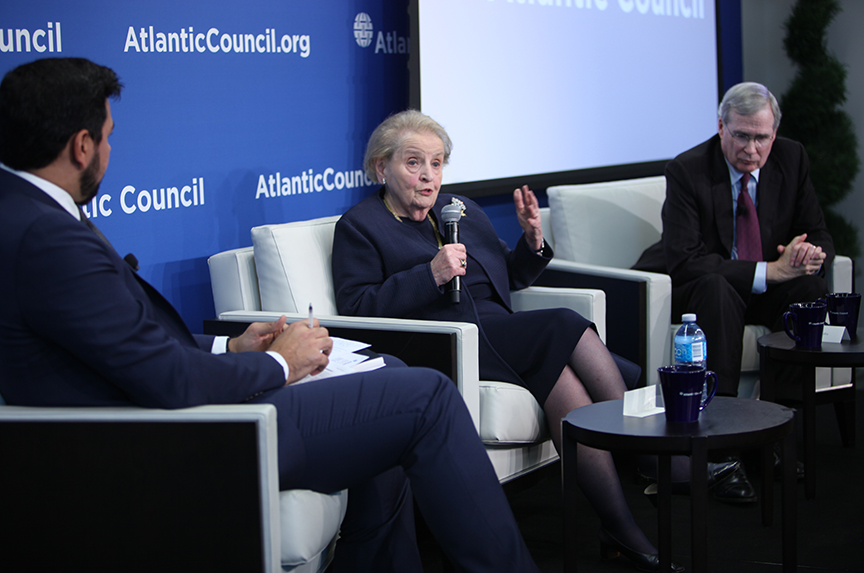
A former U.S. Secretary of State and National Security Advisor have crafted an outline for a proposed U.S. Middle East strategy that puts the onus of peace and stability in the region while keeping U.S. military intervention to a minimum.
“We tried stepping back” in the Middle East during the Obama administration, Stephen Hadley “but it hasn’t worked,” former George H.W. Bush NSA Stephen Hadley said on Wednesday. The new report – published by The Atlantic Council – was not calling for either the equivalent of a Marshall Plan or an invasion of Iraq to alter the region economically and provide stability.
Madeline Albright, former Secretary of State in the Clinton administration and co-chair of the report, said the authors realized in their interviews with key regional figures and on-the-street citizens and writing, “many Americans regard the Middle East is a mess.”
But there was reason for optimism expressed by many in the Middle East, she said.
The report’s recommendations call for a two-pronged approach first by “ending the suffering” of the civil wars in Syria, Yemen and Libya. The continued fighting is “opening the door for Daesh [the Arabic acronym for the ISIS] and al Qaeda” to spread terror around the world. It has put millions fleeing the fighting into refugee camps in Turkey and Jordan or trying to cross the Mediterranean or Aegean Seas, creating a migrant crisis in Europe. The wars run the risk of proliferating of weapons of mass destruction and their use on civilian populations. They also continue to exacerbate tensions between Iran and its Shiite allies and Saudi Arabia and its Sunni allies.
On Syria, Hadley said the report notes “It would be a mistake to make common cause” with the regime of President Bashar al-Assad. He said that means greater military support for the moderate anti-Assad forces and providing safe areas for the hundreds of thousands of civilians caught up in the fighting still in Syria.
In this area of winding down the violence, the United States, Europe, Russia and China can play a major role.
This is a top-down approach, Hadley said, to dealing with the “toxic brew” that is “not just a crisis in the Middle East [but] a crisis of the Middle East,” affecting all nations.
“Such settlements will not address the root causes of civil war,” Albright said, outlining the recommendations for a bottom-up approach.
Albright said the second prong is to incentive governments in the region to “make investments in their citizens” through a development compact to build new physical and social infrastructure.
These “efforts [would be] led by and from the region,” Hadley said. The first opportunity comes in Iraq as the Islamic State is retreating under increased military pressure to give all citizens a more responsive government.
“It’s a daunting approach,” but “it is a bet on the people of the region.”
Both said they saw promising developments in the region, citing Saudi Arabia’s new emphasis on education for all and economic development other than from energy, similar steps being taken in the United Arab Emirates and the democratic movement in Tunisia.
The recommendation in this area is “we can help you more; you can help yourself more,” Albright said. In short it’s the idea of “how we can be supportive without being bossy,” realizing that these are sovereign nations with their own interests. But remembering, “it’s a mistake not to say what we [the United States] thinks.”
If governments do not recognize the need to make these kinds of investments in education, the economy, governance and infrastructure, “you will push them into the streets,” Hadley said. He added as a warning to authoritarian regimes unwilling to change “you can’t crack down your way to stability.”
If these changes “take root” in other Middle Eastern nations, “the Iranian people will be watching,” Hadley said.
Albright said of the report, “We understand the difficulty of this.” While it’s a roadmap that will take time to implement, “you have to take the roadmap out of the glove compartment” to get where you are going eventually.





